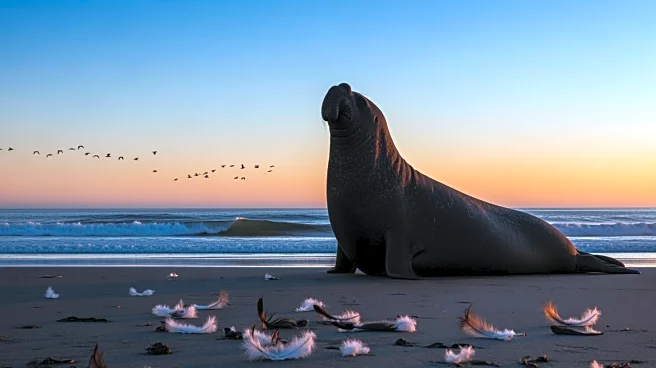What's Happening?
Southern elephant seals, the world's largest seal species, have experienced a significant decline due to a deadly strain of bird flu, H5N1, along the Patagonian coast of Argentina. Marine biologist Julieta
Campagna and other researchers discovered hundreds of dead adult and newborn seals on the beaches of Peninsula Valdés in October 2023. The seals, which typically gather annually to breed, were found dead, with seagulls feeding on the carcasses. The H5N1 virus, initially detected in poultry in 1996, mutated to spread among wild birds and eventually transmitted directly between mammals by 2022. This outbreak has sent shockwaves through the scientific community, raising concerns about the broader ecological impact.
Why It's Important?
The decline of southern elephant seals due to bird flu poses significant ecological risks. These seals play a crucial role in their ecosystem, and their sudden reduction could disrupt the balance of marine life along the Patagonian coast. The spread of H5N1 among mammals highlights the evolving threat of zoonotic diseases, which can have far-reaching consequences for wildlife conservation and public health. The situation underscores the need for increased monitoring and research to prevent further outbreaks and protect vulnerable species. The loss of these seals could also impact local economies reliant on ecotourism, as the breeding season attracts visitors to the region.
What's Next?
Researchers and conservationists are likely to intensify efforts to monitor the spread of H5N1 among marine mammals and other wildlife. There may be calls for international collaboration to develop strategies to mitigate the impact of such diseases on wildlife populations. Additionally, the scientific community might focus on understanding the virus's transmission dynamics to prevent future outbreaks. Conservation groups could advocate for protective measures to safeguard remaining seal populations and preserve the ecological integrity of the region.
Beyond the Headlines
The outbreak of H5N1 among southern elephant seals raises ethical questions about human responsibility in managing wildlife diseases. The mutation of the virus from poultry to wild birds and mammals reflects broader environmental challenges, including habitat encroachment and climate change, which can exacerbate disease spread. This situation may prompt discussions on the need for sustainable practices that minimize human impact on natural ecosystems and reduce the risk of zoonotic diseases.










